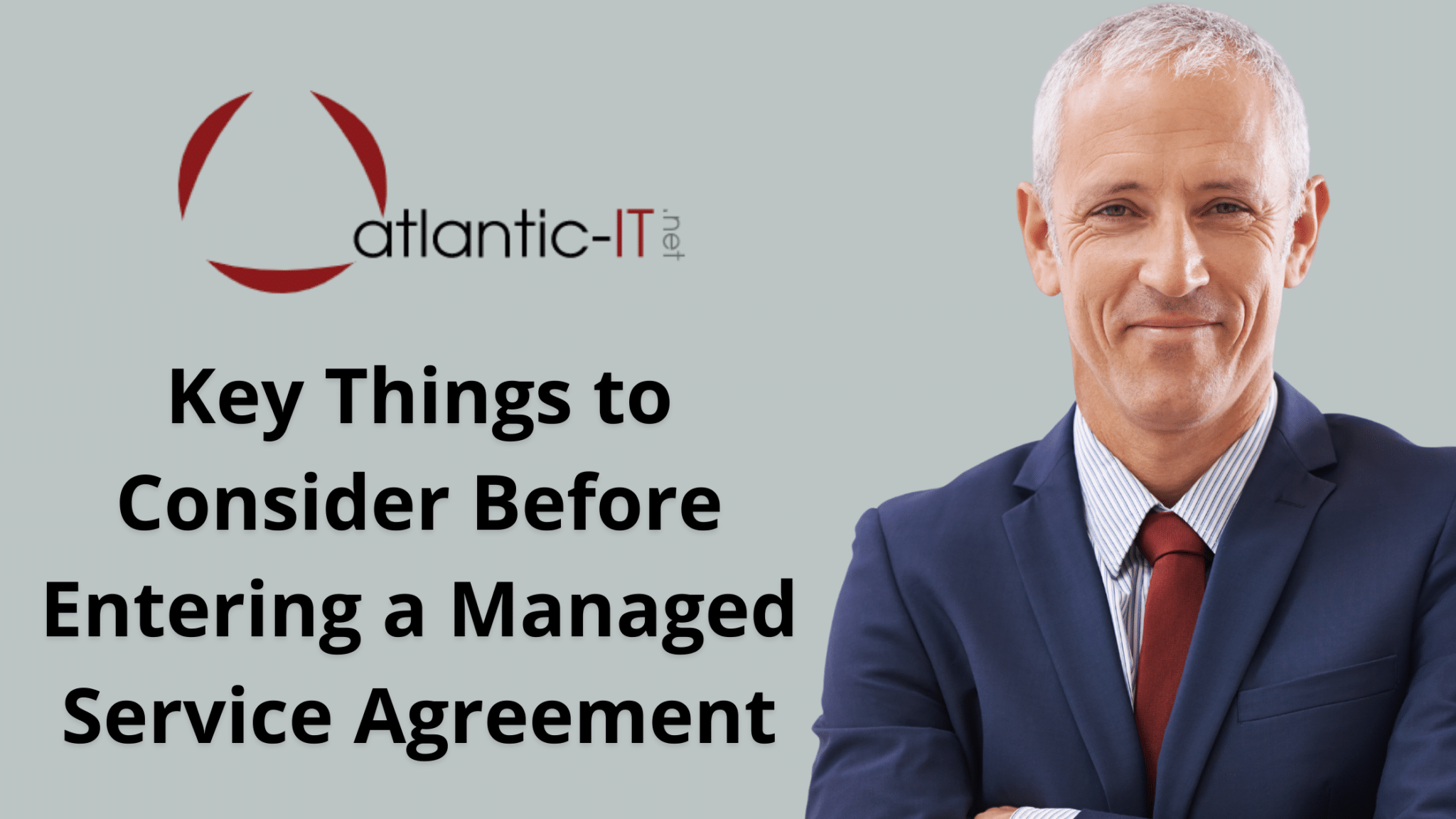
Key Things to Consider Before Entering a Managed Service Agreement
Key Things to Consider Before Entering a Managed Service Agreement
Outsourcing your IT services is one business decision you shouldn’t take lightly. You need to weigh several factors from your company’s needs to functional requirements, alignment with your business objectives, strength and weaknesses of each provider, and TCO – total cost of ownership – for every solution.
Before you invest in managed services, there are several important things you need to consider that will help you make an informed decision. It would help if you also decided what should be outsourced to the service provider and what should be kept in-house.
Benefits of Outsourcing Your IT
Outsourcing your IT can provide several benefits for your business in numerous areas. In reality, it saves your business lots of money. At the same time, it also fills noticeable gaps in your business.
Some areas you’ll save money from are: reduced to no downtime, streamlined procedures, access to experts whenever the need arises, and improved efficiency in all areas of your business due to infrastructure support to a proactive approach.
Taking everything into account, calculated outsourcing is not a handoff but a partnership.
Ask these Questions before Choosing a Managed Services Model
It is highly recommended that you ask the following questions and make sure you get satisfactory answers from both internal staff and prospective MSPs. This is to ensure that you are moving your business in the right direction.
- What are the metrics used to measure reliability, speed, and general performance?
- Does the MSP diagnose and fix service issues remotely without the intervention of your IT staff?
- Do they factor in their onsite hours into their contractual fee?
- Are they flexible enough to remove or add service offerings according to your business needs?
- What is the MSP’s average network uptime performance?
- Does the MSP have an array of capabilities and tiered features?
- Do they provide customized solutions for various businesses when it comes to achievable goals and growth plans?
- Do they use RMM (Remote Monitoring Management) or PSA (Professional Services Automation) software to run your managed services’ operations?
Key things to Consider before Entering a Managed Service Agreement
There is every chance your contract lacks important details even though it is what controls the managed services. These details are issues that may arise once operations and services start.
For this reason, you need to understand important expectations for every service component in advance before negotiations start.
There is enough room to create the best coverage that will suit your company’s needs, thanks to the ability to customize specific IT services. With time, your situation may change, which can make you change your coverage.
Before you enter a managed service agreement, you need to know the vital items included. You also need to know if it will add value to your company.
We’ve listed the key things to note to help answer the above questions and put you in a place to make an informed decision.
Helpdesk Support – Remote or On-Premises
Most contracts often come with helpdesk managed support. On the other hand, you need to know if the MSP will only provide remote support or local.
If your existing IT services are fully cloud-based, you’ll have no problem with remote support. However, you need to know the number of hours of helpdesk support specified in the agreement. If it isn’t round the clock support, ensure it covers your work hours, and find out if they offer weekend support.
Network Monitoring
All parts of your IT network and network monitoring – should be covered by the service agreement. The role of control is important, especially with vulnerabilities that can cause network disruption.
In most solutions, the MSP monitors every aspect of your IT system. Notwithstanding, you need to ask if they cover remote users, virtual machines, and mobile devices. Also, network monitoring must come with firewall control and configuration, together with intrusion detection and prevention.
Security
At this time, security is a priority for every business. Your MSP should have a detailed plan that shows how they will address your cybersecurity concerns. Their process must consist of:
- Infrastructure Administration
- Intrusion detection
- Firewall settings
- File-level Encryption
- Intrusion prevention
- How their services are carried out
Also, every managed service needs to come with storage maintenance, basic server maintenance, typical network issues, and network administration.
If possible, the managed services contract must cover everything you want to be done on your network. Right before you meet with the MSP, make sure you list your requirements.
The list should show your existing IT service needs, and it must correspond with the provider’s contract agreement.
Disaster Recovery Plan
A disaster recovery plan is another key factor to consider before entering a service agreement. If it’s not mentioned, you should request that it’s added.
Your IT service contract should come with a comprehensive, location-dependent disaster recovery plan. Should disaster strike, you’ll want a recovery plan and instant access to your backups, so you’re back online as soon as possible.
Data Backup
You also need to know how your data will be stored and backed up. Even though you may have storage assets and physical backups on your premises, your MSP will most likely use cloud storage for this function.
If this is the case, you need to ask several questions like:
- The security of their backup solution
- If the backup is hosted on a private or public cloud server.
- If it’s a public cloud, will a private cloud be used for backup?
- If they don’t use cloud storage, where will the backups be stored?
Termination of Service
Some businesses may decide that their in-house IT staff should manage their IT networks. Before you go into any agreement, you need to know what will happen should you want to terminate your contract.
You need to know upfront – if your managed services contract is terminated, would you be made to pay a yearly or monthly renewal? Will you be penalized for canceling before the expiry date? What are the things that are considered acceptable should the MSP want to cancel?
Non-Solicitation Agreement
This agreement protects all parties involved in the deal. It states in clear terms that neither party can lobby to hire or reach out to their respective employees.
As a standard practice, an MSP cannot sell your data to other businesses, especially those that want to enter a service agreement with your company. However, make sure this is something you consider before you sign the dotted lines.





